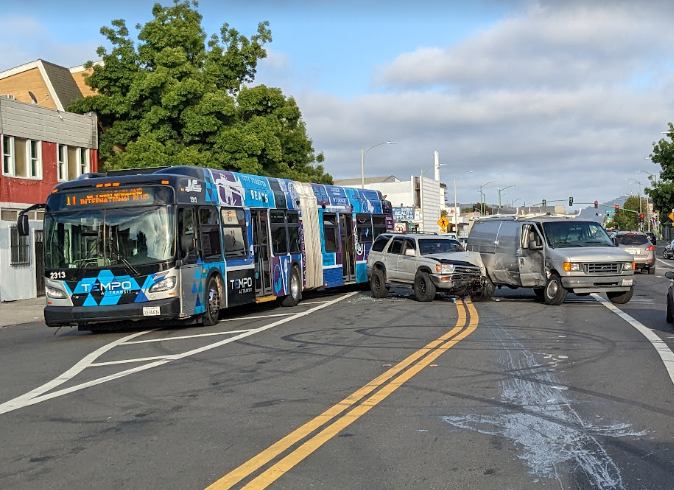In the summer of 2020, AC Transit launched its long awaited TEMPO bus service on International Boulevard from San Leandro to downtown Oakland. The project featured bus-only lanes and train-like amenities, such as pre-paid boarding from dedicated platforms. It also included a total rebuild of International Boulevard.
However, the project was hamstrung by compromises, such as San Leandro refusing to allow a bus-only lane and Oakland falling short on separation for the lane. The result has been a less-than-advertised bus service--and, according to research from the advocates at "Traffic Violence Rapid Response," a dramatic uptick in deadly crashes.
From the group's International Speeds Report, which they presented to the AC Transit Board on Wednesday evening. The root of that uptick is excessive speeding by car drivers, facilitated by the boulevard's compromise design :
Tragedies along International Blvd, of young and old injured and killed by traffic violence, have mounted in recent years. To understand this trend, Traffic Violence Rapid Response undertook a large-data traffic speeds analysis to examine the crisis.
This analysis reviews roughly 7 million sample speed observations from two two-month long periods before and after the installation of the AC Transit’s TEMPO Bus Rapid Transit (BRT) lanes along International Boulevard in Oakland, California. Critically, the study finds evidence that virtually the entire route alignment saw a marked increase in 85th percentile speeds along this pedestrian-heavy transit corridor post installation.
Those speed increases were made possible, suggest the study authors, by the fact that AC Transit didn't come through on using concrete separations for traffic calming and to keep private cars out of the bus lane. Again from the study:
The original TEMPO BRT project was sold to communities as a bus reliability project with built-in pedestrian safety features. During outreach, the project specifically highlighted “Streetscape Features” including “raised, ‘curb separated’ islands” to “create pedestrian protected crossings.” These were never installed fully or correctly. The curb separation is non-existent along the entirety of the TEMPO alignment. This analysis suggests that the lack of pedestrian safety features have also correlated with a significant human toll,as we see International’s increase from virtually none of the traffic fatalities during construction to now well over a quarter of all such deaths in Oakland in 2022.
The study authors conclude that AC Transit must install "physical lane delineators in light of continued extreme rates of death and severe injury on International."

They also urge Alameda County's bus operator to stop pushing for maximizing bus speeds and instead to take a holistic approach to road designs. Fighting to protect dangerous slip turns, installing beg buttons, and pushing back against protected bike lanes in the name of maintaining bus speeds has the unintended consequence of enabling car-drivers to go at unsafe speeds. And that's deadly for pedestrians, including AC Transit's own customers.
Be sure to check out the entire report.






